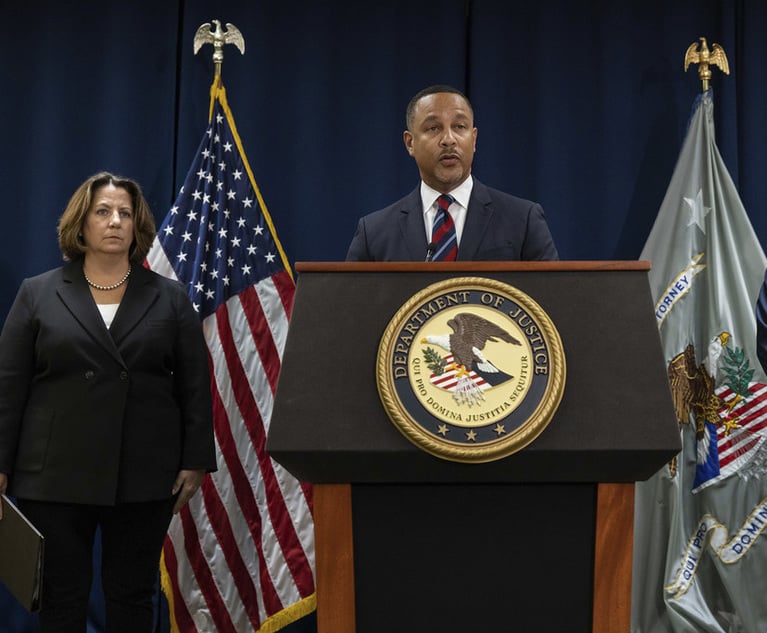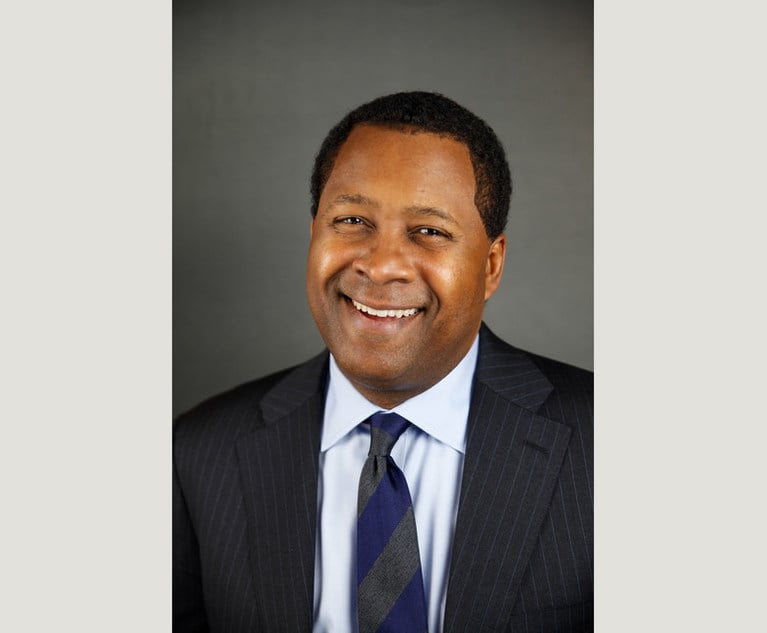Compliance Hot Spots: Changing the House Rules: What to Know | How Government Lawyers Wished You Handled Investigations | Who Got the Work
What outside counsel needs to know about changes to US House deposition rules. Plus: here's how government lawyers wished you handled investigations. Scroll down for Who Got the Work and our compliance and white-collar moves roundup. Thanks for reading!
January 29, 2019 at 09:00 PM
7 minute read
Welcome to Compliance Hot Spots, our weekly look at the regulatory and white-collar enforcement world. Thanks for reading—and please continue to send feedback. I appreciate hearing from you about what's on your plate—observations, trends, new clients. I'm at [email protected] and 202-828-0315, or follow me on Twitter @cryanbarber.
House Dems Streamline Deposition Rules
These are very much the early days of the 116th Congress, but U.S. House Democrats have already used their regained power to launch probes into drug companies and the White House's process for handing out security clearances.
Meanwhile, Democrats are continuing to lay a foundation for future investigations, taking procedural steps to streamline probes and make them “efficient and effective,” as U.S. Rep. Elijah Cummings (above), the Maryland Democrat and chairman of the House Oversight and Reform Committee, likes to say.
The latest of such moves came from the House Rules Committee, which removed a stumbling block for depositions by allowing Democratic leaders of committees to rule more quickly on objections to questioning.
Under the Republican-led House rules, committee chairmen could rule on objections after a deposition recessed. And if a chairman overruled an objection and ordered a witness to answer a question, at least three days would have to pass before the deposition could resume.
Not anymore. The new rules allow House investigators to get an immediate ruling from the committee's leader—”either by telephone or otherwise.” “If the chair overrules any such objection and thereby orders a witness to answer any question to which an objection was lodged, the witness shall be ordered to answer,” the new rules state. >> McDermott, Will & Emery counsel Sam Dewey told me the old rules often created a “logistical nightmare” that would delay investigations. House investigators would decide that fighting the objection wasn't worth the extensive process. “Now you can literally get the chairman on the phone. It's much more of a direct approach, with much less delay,” said Dewey, who served from 2017 to 2018 as senior counsel for the Republican-led House Financial Services Committee. >> Gibson, Dunn & Crutcher partner Thomas Hungar, who served from 2016 through 2018 as the House general counsel, told me that “it's another change that I assume is intended, and I think will probably succeed, in streamlining depositions and make them a more effective tool for the majority in trying to get information more quickly.”
The House Rules Committee's move comes weeks after Democrats made it easierfor their investigators to take depositions in the first place. In the past eight years of Republican control, House rules have required at least one lawmaker to be in attendance at a deposition for questioning to proceed.
The attendance requirement created logistical headaches for House staff and provided an opening for adversarial witnesses to drag their feet—say, by claiming they were only available during the summer recess.
Republicans on the House Oversight and Reform Committee criticized the rule change Tuesday but dropped their opposition after Cummings pledged to make his “best effort” give additional notice of depositions during the August recess.
Cummings said the change was intended to make investigations “efficient and effective” and remove a rule that made depositions difficult to schedule.
“I just don't want the process to be held up,” he said.
Compliance Headlines: 3 Ways Gov't Lawyers Wished You Handled Investigations
>> Three ways government attorneys wished you handled investigations. Among them: Be prepared. Place legal holds. And enable whistleblowers. Glenn Melcher, special counsel for e-discovery at the Consumer Financial Protection Bureau, said at a Legalweek 2019 panel: “It's best to come to the meeting with someone who knows your data and knows your organization.” [Law.com]
>> Fourth quarter lobbying results show Brownstein Hyatt gaining ground on Akin Gump. [NLJ]
>> Texas lawyer Juan Lozada, a former compliance officer at MoneyGram International Inc. in Dallas, has filed a retaliation and wrongful termination suit against the company. [Law.com]
>> U.S. securities regulators are investigating Nissan in connection with the pay disclosures of the carmaker's former chairman, Carlos Ghosn, who stands charged in Japan with underreporting his pay by $80 million in a span of eight years, The Wall Street Journal reports.
Who Got the Work
>> An Alston & Bird team—Including Theodore Schroeder, former chief counsel to U.S. Senator Christopher Coons, D-Delaware—has registered to lobby for the consulting firm McKinsey & Company. The Senate disclosure said the advocacy would focus on: “Oversight of U.S. Bankruptcy Code implementation with specific reference to anti-competitive activities that could harm creditors, debtors, advisors, consumers, and restructured businesses and their employees; oversight of issues related to McKinsey & Co. work before the Financial Oversight Management Board (“FOMB”) in Puerto Rico.” Regulators are assessing McKinsey's bankruptcy work for Puerto Rico.
>> The SEC reached settlements with four public companies Tuesday resolving claims that they failed to maintain internal controls over their financial reporting. Each of the four companies—Grupo Simec S.A.B de C.V; Lifeway Foods Inc.; Digital Turbine Inc.; CytoDyn Inc.—took months or even years to address issues raised by SEC staff, the agency said. Orrick, Herrington & Sutcliffe partner Richard Morvillorepresented Grupo Simec S.A.B de C.V., which agreed to pay a $200,000 penalty and hire an outside consultant. Lifeway Foods (represented by Kelley Drye & Warrenpartner Randall Lerner) and Digital Turbine (represented by Manatt, Phelps & Phillips partner Jacqueline Wolff) agreed to pay 100,000. Lowenstein Sandlercounsel Jamie Furia represented CytoDyn, which agreed to pay a $35,000 penalty.
>> A federal judge in Miami ordered Woodbridge Group of Companies LLC and its former owner to pay $1 billion in penalties and disgorgement for running a Ponzi scheme that defrauded thousands of investors, including many seniors who invested retirement funds. Judge Marcia G. Cooke approved judgments against Woodbridge and its 281 related companies ordering them to pay $892 million in disgorgement. Woodbridge's former CEO and owner, Robert H. Shapiro, was ordered to pay a $100 million penalty and surrender $18.5 million in ill-gotten gains. Shapiro was represented by DLA Piper partner Ryan O'Quinn.
Notable Moves & Announcements
>> J.H. Jennifer Lee is joining Arent Fox in San Francisco from Dorsey & Whitney, where she was a partner. Lee earlier served as an enforcement attorney in the Consumer Financial Protection Bureau's field litigation team.
>> Akin Gump Strauss Hauer & Feld has added Karen Christian as a partner in its congressional investigations practice in Washington, D.C., from the U.S. House Committee on Energy and Commerce.
>> Shamoil Shipchandler, formerly director of the U.S. Securities and Exchange Commission's Fort Worth Regional Office, is heading to Jones Day, Bloomberg BNA reports. Read the SEC's announcement here.
>> Michael Gottlieb has jumped from Boies Schiller Flexner to Willkie Farr & Gallagher, where he will remain in Washington and be a leader of the firm's new crisis management practice. Gottlieb earlier was an associate White House counsel under President Barack Obama.
>> Eulonda Skyles, formerly Capital One's associate general counsel for privacy and data security, is joining Baker Hostetler's Washington office
>> “Christopher D'Angelo, an associate director of the CFPB's Supervision, Enforcement and Fair Lending division, will become chief deputy attorney general for economic justice starting in February, Attorney General Letitia James's office said,” Bloomberg News reports.
>> Christopher Armstrong, the former chief oversight counsel for the Senate Finance Committee, has joined Holland & Knight as a partner in the firm's public policy and regulation practice. “With the number of investigations anticipated to increase significantly in the 116th Congress, I hope to be an effective advocate for those facing these types of inquiries, helping them navigate the process and the unique rules that apply in what can be a difficult experience for them,” Armstrong said in a prepared statement.
This content has been archived. It is available through our partners, LexisNexis® and Bloomberg Law.
To view this content, please continue to their sites.
Not a Lexis Subscriber?
Subscribe Now
Not a Bloomberg Law Subscriber?
Subscribe Now
NOT FOR REPRINT
© 2025 ALM Global, LLC, All Rights Reserved. Request academic re-use from www.copyright.com. All other uses, submit a request to [email protected]. For more information visit Asset & Logo Licensing.
You Might Like
View All
Compliance Hot Spots: GOP Eyes ESG as an Antitrust Issue + Another DOJ Crypto Seizure + Sidley Partner Jumps to Main Justice
9 minute read
Compliance Hot Spots: Lessons from Lafarge + Fraud Section Chief Talks Compliance + Cravath Lands FTC Commissioner
11 minute readTrending Stories
- 1ACC CLO Survey Waves Warning Flags for Boards
- 2States Accuse Trump of Thwarting Court's Funding Restoration Order
- 3Microsoft Becomes Latest Tech Company to Face Claims of Stealing Marketing Commissions From Influencers
- 4Coral Gables Attorney Busted for Stalking Lawyer
- 5Trump's DOJ Delays Releasing Jan. 6 FBI Agents List Under Consent Order
Who Got The Work
J. Brugh Lower of Gibbons has entered an appearance for industrial equipment supplier Devco Corporation in a pending trademark infringement lawsuit. The suit, accusing the defendant of selling knock-off Graco products, was filed Dec. 18 in New Jersey District Court by Rivkin Radler on behalf of Graco Inc. and Graco Minnesota. The case, assigned to U.S. District Judge Zahid N. Quraishi, is 3:24-cv-11294, Graco Inc. et al v. Devco Corporation.
Who Got The Work
Rebecca Maller-Stein and Kent A. Yalowitz of Arnold & Porter Kaye Scholer have entered their appearances for Hanaco Venture Capital and its executives, Lior Prosor and David Frankel, in a pending securities lawsuit. The action, filed on Dec. 24 in New York Southern District Court by Zell, Aron & Co. on behalf of Goldeneye Advisors, accuses the defendants of negligently and fraudulently managing the plaintiff's $1 million investment. The case, assigned to U.S. District Judge Vernon S. Broderick, is 1:24-cv-09918, Goldeneye Advisors, LLC v. Hanaco Venture Capital, Ltd. et al.
Who Got The Work
Attorneys from A&O Shearman has stepped in as defense counsel for Toronto-Dominion Bank and other defendants in a pending securities class action. The suit, filed Dec. 11 in New York Southern District Court by Bleichmar Fonti & Auld, accuses the defendants of concealing the bank's 'pervasive' deficiencies in regards to its compliance with the Bank Secrecy Act and the quality of its anti-money laundering controls. The case, assigned to U.S. District Judge Arun Subramanian, is 1:24-cv-09445, Gonzalez v. The Toronto-Dominion Bank et al.
Who Got The Work
Crown Castle International, a Pennsylvania company providing shared communications infrastructure, has turned to Luke D. Wolf of Gordon Rees Scully Mansukhani to fend off a pending breach-of-contract lawsuit. The court action, filed Nov. 25 in Michigan Eastern District Court by Hooper Hathaway PC on behalf of The Town Residences LLC, accuses Crown Castle of failing to transfer approximately $30,000 in utility payments from T-Mobile in breach of a roof-top lease and assignment agreement. The case, assigned to U.S. District Judge Susan K. Declercq, is 2:24-cv-13131, The Town Residences LLC v. T-Mobile US, Inc. et al.
Who Got The Work
Wilfred P. Coronato and Daniel M. Schwartz of McCarter & English have stepped in as defense counsel to Electrolux Home Products Inc. in a pending product liability lawsuit. The court action, filed Nov. 26 in New York Eastern District Court by Poulos Lopiccolo PC and Nagel Rice LLP on behalf of David Stern, alleges that the defendant's refrigerators’ drawers and shelving repeatedly break and fall apart within months after purchase. The case, assigned to U.S. District Judge Joan M. Azrack, is 2:24-cv-08204, Stern v. Electrolux Home Products, Inc.
Featured Firms
Law Offices of Gary Martin Hays & Associates, P.C.
(470) 294-1674
Law Offices of Mark E. Salomone
(857) 444-6468
Smith & Hassler
(713) 739-1250














